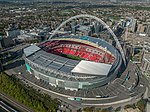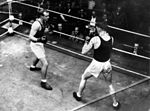Nelson Mandela: An International Tribute for a Free South Africa
1990 in London1990 in musicApril 1990 events in the United KingdomConcerts at Wembley StadiumMusic festivals in London ... and 5 more
Musical tributes by personNelson MandelaRock festivals in EnglandTribute concerts in the United KingdomUse British English from July 2012
Nelson Mandela: An International Tribute for a Free South Africa was a music concert that took place on 16 April 1990 at Wembley Stadium, Wembley Park, London, United Kingdom (UK) and was broadcast to more than 60 countries. It was held two months after the release of Nelson Mandela from a South African apartheid prison and was regarded by Mandela as an official international reception.
Excerpt from the Wikipedia article Nelson Mandela: An International Tribute for a Free South Africa (License: CC BY-SA 3.0, Authors).Nelson Mandela: An International Tribute for a Free South Africa
Atlantic Crescent, London
Geographical coordinates (GPS) Address Nearby Places Show on map
Geographical coordinates (GPS)
| Latitude | Longitude |
|---|---|
| N 51.556083333333 ° | E -0.27908333333333 ° |
Address
Wembley Stadium
Atlantic Crescent
HA9 0PQ London (London Borough of Brent)
England, United Kingdom
Open on Google Maps





